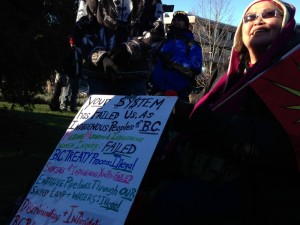As if Idle No More can be reduced to academic theory, today’s National Post went a step further and reduced the academic theory to “indigenism.” Drawing on an analysis from University of Calgary professor an ex-advisor to the Harper government Tom Flanagan, the Post strikes a defensive tone from the start: “It is a realm in which it is uncontroversial to call Canada an illegitimate, racist, colonial power, or to claim its government is now engaged in the genocide of its native peoples, or that non-native Canadians, especially those of European descent, are “colonizers,” at best blind to their own bigotry and privilege.” Flanagan concludes that this is “standard fare among the academic left.” “That’s what’s driving Idle No More,” he says. “It’s not new. This whole vision was widely articulated during the hearings on the Royal Commission on Aboriginal Peoples.” Read more: National Post.
Rather than begging a question of academic theories behind the movement, the Post would be much better off covering the movement behind the theories or asking whether theorists are now poised to invite and welcome the movement to the doorsteps and inside the halls of academia.
All of this begs the question of whether students, this year nationally, will have the politics such as that demonstrated in force across Quebec from February through August to sustain their foothold on Idle No More. As Algonquin journalist Martin Lukacs wrote last year in “Quebec student protests mark ‘Maple spring’ in Canada,” “the fault-lines of the struggle over education — dividing those who preach it must be a commodity purchased by “consumers” for self-advancement, and those who would protect it as a right funded by the state for the collective good — has thus sparked a fundamental debate about the entire society’s future…. Little wonder students’ imagination was stirred by the past year of world rebellion. That inspiration has been distilled in the movement’s main slogan, “Printemps érable,” a clever play on words that literally means Maple Spring but sounds like Arab Spring.”
Indeed, the Quebec student association ASSÉ released a statement yesterday committing to solidarity with indigenous students and Idle No More: “We stand in solidarity with Idle No More. We stand in solidarity with Indigenous hunger strikers Theresa Spence, Emil Bell, Raymond Robinson, Aniesh Vollant and Janet Pilot from the Quebec Innu community of Uashat, and others whose names we have not yet learned.”
“If 2012 was the year of our Maple Spring, we are ready to greet the Native spring of 2013.”


 Follow
Follow